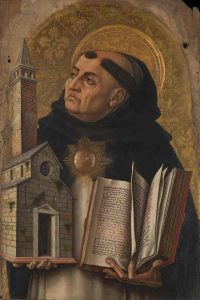Nothing but Yourself, Lord!

Fra pave Benedikt XVIs onsdagsaudiens 2. juni 2010:
Thomas Aquinas, at the school of Albert the Great, did something of fundamental importance for the history of philosophy and theology, I would say for the history of culture: he made a thorough study of Aristotle and his interpreters, obtaining for himself new Latin translations of the original Greek texts. Consequently he no longer relied solely on the Arab commentators but was able to read the original texts for himself. He commented on most of the Aristotelian opus, distinguishing between what was valid and was dubious or to be completely rejected, showing its consonance with the events of the Christian Revelation and drawing abundantly and perceptively from Aristotle’s thought in the explanation of the theological texts he was uniting.
In short, Thomas Aquinas showed that a natural harmony exists between Christian faith and reason. And this was the great achievement of Thomas who, at that time of clashes between two cultures that time when it seemed that faith would have to give in to reason showed that they go hand in hand, that insofar as reason appeared incompatible with faith it was not reason, and so what appeared to be faith was not faith, since it was in opposition to true rationality; thus he created a new synthesis which formed the culture of the centuries to come.
Because of his excellent intellectual gifts Thomas was summoned to Paris to be professor of theology on the Dominican chair. Here he began his literary production which continued until his death and has something miraculous about it: he commented on Sacred Scripture because the professor of theology was above all an interpreter of Scripture; and he commented on the writings of Aristotle, powerful systematic works, among which stands out his Summa Theologiae, treatises and discourses on various subjects. He was assisted in the composition of his writings by several secretaries, including his confrere, Reginald of Piperno, who followed him faithfully and to whom he was bound by a sincere brotherly friendship marked by great confidence and trust. This is a characteristic of Saints: they cultivate friendship because it is one of the noblest manifestations of the human heart and has something divine about it, just as Thomas himself explained in some of the Quaestiones of his Summa Theologiae. He writes in it: «it is evident that charity is the friendship of man for God» and for «all belonging to him» (Vol. II, q. 23, a. 1).
He did not stay long or permanently in Paris. In 1259 he took part in the General Chapter of the Dominicans in Valenciennes where he was a member of a commission that established the Order’s programme of studies. Then from 1261 to 1265, Thomas was in Orvieto. Pope Urban IV, who held him in high esteem, commissioned him to compose liturgical texts for the Feast of Corpus Christi, which we are celebrating tomorrow, established subsequent to the Eucharistic miracle of Bolsena. Thomas had an exquisitely Eucharistic soul. The most beautiful hymns that the Liturgy of the Church sings to celebrate the mystery of the Real Presence of the Body and Blood of the Lord in the Eucharist are attributed to his faith and his theological wisdom. From 1265 until 1268 Thomas lived in Rome where he probably directed a Studium, that is, a study house of his Order, and where he began writing his Summa Theologiae (cf. Jean-Pierre Torrell, Tommaso d’Aquino. L’uomo e il teologo, Casale Monf., 1994, pp. 118-184).
In 1269 Thomas was recalled to Paris for a second cycle of lectures. His students understandably were enthusiastic about his lessons. One of his former pupils declared that a vast multitude of students took Thomas’ courses, so many that the halls could barely accommodate them; and this student added, making a personal comment, that «listening to him brought him deep happiness». Thomas’ interpretation of Aristotle was not accepted by all, but even his adversaries in the academic field, such as Godfrey of Fontaines, for example, admitted that the teaching of Friar Thomas was superior to others for its usefulness and value and served to correct that of all the other masters. Perhaps also in order to distance him from the lively discussions that were going on, his Superiors sent him once again to Naples to be available to King Charles i who was planning to reorganize university studies.
In addition to study and teaching, Thomas also dedicated himself to preaching to the people. And the people too came willingly to hear him. I would say that it is truly a great grace when theologians are able to speak to the faithful with simplicity and fervour. The ministry of preaching, moreover, helps theology scholars themselves to have a healthy pastoral realism and enriches their research with lively incentives.
The last months of Thomas’ earthly life remain surrounded by a particular, I would say, mysterious atmosphere. In December 1273, he summoned his friend and secretary Reginald to inform him of his decision to discontinue all work because he had realized, during the celebration of Mass subsequent to a supernatural revelation, that everything he had written until then «was worthless». This is a mysterious episode that helps us to understand not only Thomas’ personal humility, but also the fact that, however lofty and pure it may be, all we manage to think and say about the faith is infinitely exceeded by God’s greatness and beauty which will be fully revealed to us in Heaven. A few months later, more and more absorbed in thoughtful meditation, Thomas died while on his way to Lyons to take part in the Ecumenical Council convoked by Pope Gregory X. He died in the Cistercian Abbey of Fossanova, after receiving the Viaticum with deeply devout sentiments.
The life and teaching of St Thomas Aquinas could be summed up in an episode passed down by his ancient biographers. While, as was his wont, the Saint was praying before the Crucifix in the early morning in the chapel of St Nicholas in Naples, Domenico da Caserta, the church sacristan, overheard a conversation. Thomas was anxiously asking whether what he had written on the mysteries of the Christian faith was correct. And the Crucified One answered him: «You have spoken well of me, Thomas. What is your reward to be?». And the answer Thomas gave him was what we too, friends and disciples of Jesus, always want to tell him: «Nothing but Yourself, Lord!» (ibid., p. 320).
Les hele katekesen her: https://www.vatican.va/content/benedict-xvi/en/audiences/2010/documents/hf_ben-xvi_aud_20100602.html

